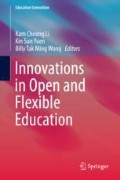Abstract
The University of Wollongong’s first locally developed and hosted massive open online course (MOOC) The Reluctant Mathematician was a highly scaffolded MOOC designed to support stressed and low-efficacy mathematics learners. It was developed to raise maths skills at our university and also in the community – where such skills continue to be a challenge and in some cases a source of stress. Internally, the MOOC provided an alternative online way to support students who struggle with mathematics at university level and as a complement to the existing face-to-face services. This paper describes a successful approach to using MOOCs not only for addressing skills shortage among university students but also to engage staff in the hybrid learning aspects of curriculum transformation. Based on a small-scale pilot, this paper describes the narrative of engagement of academics and highlights the main elements which were conducive to their involvement in selecting and using the MOOC as support for an assignment in their curriculum. A framework is proposed for educators who are interested in using MOOCs for a similar purpose.
Access this chapter
Tax calculation will be finalised at checkout
Purchases are for personal use only
References
Campbell, A. (2013). What threats and benefits do free online mathematics courses pose to traditional universities? Paper presented at the proceedings of the 19th annual congress of the Association for Mathematics Education of South Africa. Cape Town.
Conole, G. (2007). An international comparison of the relationship between policy and practice in e-learning. In Handbook of e-learning research (pp. 286–310). London: Sage Publications.
Delbanco, A. (2013). MOOCs of hazard: Will online education dampen the college experience? Yes: Will it be worth it? Well. Retrieved from https://newrepublic.com/article/112731/moocs-will-online-education-ruin-university-experience05/05/2015
Greenagel, F. L. (2002). The illusion of e-learning: Why we are missing out on the promise of technology. League White Papers.
Hoban, G., Nielsen, W., & Carceller, C. (2010). Articulating constructionism: Learning science through designing and making ‘Slowmations’ (Student-generated animations). In C. H. Steel, M. J. Keppell, P. Gerbic, & S. Housego (Eds.), Curriculum, technology & transformation for an unknown future (pp. 433–443). Brisbane, Australia: University of Queensland.
Huber, M. T., & Hutchings, P. (2004). Integrative learning: Mapping the terrain. The academy in transition. Washington, DC: Association of American Colleges and Universities.
Kuh, G. D. (2008). Excerpt from high-impact educational practices: What they are, who has access to them, and why they matter. Washington, DC: Association of American Colleges and Universities.
Lambert, S. (2015). Reluctant mathematician: Skills-based MOOC scaffolds wide range of learners. Journal of Interactive Media in Education, 1, 1–11.
N. L. (2013). The Economist explains: Will MOOCs kill university degrees?. Retrieved from http://www.economist.com/blogs/economist-explains/2013/10/economist-explains
Pappano, L. (2012). The year of the MOOC. Retrieved from http://www.nytimes.com/2012/11/04/education/edlife/massive-open-online-courses-are-multiplying-at-a-rapid-pace.html?_r=0
Professions Australia. (2008). Higher education policy: Delivering Australia’s future professional workforce requirements. Professions Australia.
Valentin, M. A., Nafukho, F., Valentin Jr, C., Johnson, D. D., & LeCount, J. (2014). Return on investment: Contrary to popular belief, MOOC’s are not free. Paper presented at the 14th international conference on HRD theory and practice across Europe. Manchester, UK.
Author information
Authors and Affiliations
Corresponding author
Editor information
Editors and Affiliations
Rights and permissions
Copyright information
© 2018 Springer Nature Singapore Pte Ltd.
About this chapter
Cite this chapter
Lambert, S., Alony, I. (2018). Embedding MOOCs in Academic Programmes as a Part of Curriculum Transformation: A Pilot Case Study. In: Li, K., Yuen, K., Wong, B. (eds) Innovations in Open and Flexible Education. Education Innovation Series. Springer, Singapore. https://doi.org/10.1007/978-981-10-7995-5_7
Download citation
DOI: https://doi.org/10.1007/978-981-10-7995-5_7
Published:
Publisher Name: Springer, Singapore
Print ISBN: 978-981-10-7994-8
Online ISBN: 978-981-10-7995-5
eBook Packages: EducationEducation (R0)

